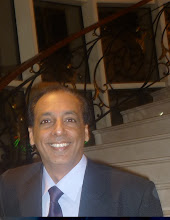About Me
Monday, September 21, 2009
Insecurity is Your Best Security
The main thing in life is RESULTS!
- Our perception: Our ability to see things differently
- Our will: Our will to change and get results
- Our imagination: People with great imagination achieve the most
- Our memory: Forget about the past, especially the negatives and remember the positives that will help you achieve the results
- Our intuition and ability to listen to that inner voice
- Our reason
Easy - Difficult
Sunday, September 20, 2009
Are the Brains of Leaders wired differently?
TEN WORDS
WORK EFFECTIVELY WITH THE INDIANS
Strong Indian Economy has continued to have a global impact
Mentioned below are the excerpts of preparation of Seminar by French, for French Business Community, on "WORKING EFFECTIVELY WITH THE INDIANS”
Its interesting to see the topics and Areas focused.
I found this knowledge interesting and thought of sharing it on my Blog
(This excerpt is translated from French to English)
DATES: October 6, 2009
HOURS: 9H - 17H
LOCATION: PARIS
WORK EFFECTIVELY WITH THE INDIANS
No Purpose and Pedagogy
This seminar will increase an immediate and significant efficacy of the participants in their interactions with Indians. It may be appropriate, especially for participants working "remotely" with the Indians.
The seminar is based both on the more advanced principles of intercultural management and experience "field" of the facilitator. Thus, participants will discover all the main concepts for working effectively with the Indians. All will be illustrated by numerous examples, anecdotes, tips and pointers.
- Participants will be involved very actively in several exercises and group work.
Program
1) Introduction: Understanding cultural differences
In this chapter you will:
- Discover what the Intercultural Cases
- Study the different components of a culture
- Become aware of your "baggage" cultural
- Learn the basics of intercultural management
- Discover the "change curve", the "cultural iceberg", etc..
- Learn to go beyond the stereotypes
2) The Indian culture: the indispensable foundation
In this chapter you will discover and understand the influences of geography, history, religion, on Indian culture and context of your audience
- How to avoid "stupid mistakes"
- Understand the key aspects of Indian culture
- The major philosophical and religious landmarks: Hinduism, Jainism, Buddhism, etc..
- The puzzle of caste
- The weight of family and clan
- Regional identities and ethnic groups
- The importance of "popular culture"
3) Golden rules:
In this chapter you'll learn:
- The basic rules that must absolutely meet with Indians
- And how to use ...
4) The manager's checklist
In this chapter you will discover the essential elements for success with the Indians:
- The importance of the personal relationship
- The values and behavior of Indians
- The custom and practice in work
- Knowledge live in Cases
- Why spend time in "small talk"
- What does "save face" or "give face"
- Superstition in business
- The woman in business, "Mother India" Etc..
5) Working with Indians
In this chapter you will:
- Discover the major key understandings of Indians in the work
- Differences between "world views" European and Indian world a permanent or a cyclical world
- Strategy and opportunism
- Conceptual and practical
- Learn to communicate effectively with the Indians
- How to use remote communications (mail, telephone, video conferencing, etc..)
- Explore the process of Indian decision
- How to hear and recognize the "no" Indian
- Discover how efficiently a project manager with Indian teams
- How to get the Indians to be "results oriented"
- How to meet deadlines
6) Action Plan
In this chapter, you define an action plan practical and realistic to achieve better and faster your goals:
- Developing your personal action plan
- Develop action plan for your team
7) "review package"
In this chapter you will learn the latest tips:
- How to use the cards
- Gifts
- The use of any translator
- The non-verbal language
- How to use humor
- The dress
- The code of etiquette ...Etc..






